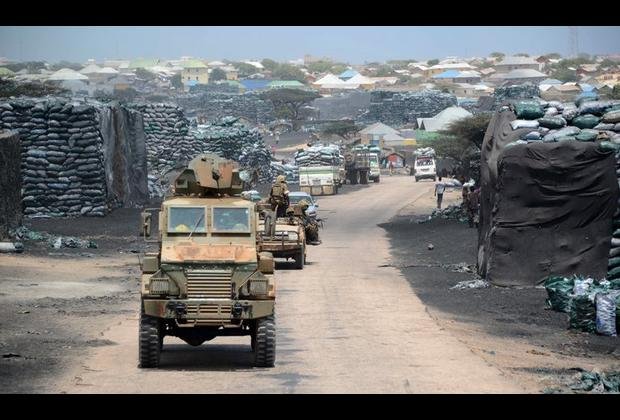Kenyan peacekeepers aided illegal Somalia charcoal export - U.N.
UNITED NATIONS | Sun Jul 14, 2013
(Reuters) - A confidential report by U.N. monitors accuses Kenyan soldiers in
the African Union peacekeeping force in Somalia of facilitating illegal charcoal
exports from the port city of Kismayu, a business that generates millions of
dollars a year for Islamic militants seeking to topple the government.
The case of the failed ban on Somali charcoal outlined in the report highlights
the difficulty of cutting off al Shabaab militants' funding and ensuring
compliance with U.N. sanctions when there is little appetite for enforcing them
on the ground.
The Kenyan military denied the allegations in the U.N. Monitoring Group's latest
annual report to the Security Council's sanctions committee on Somalia and
Eritrea.
The report was completed before recent clashes in Kismayu.
In that fighting, rival militias battled for control of the strategic port city
after Ahmed Madobe, leader of the Ras Kamboni militia and a former Islamist
warlord, became leader of the Jubaland region, which includes Kismayu, in May.
The situation remains tense though the Mogadishu government, which initially
opposed Madobe, is letting him stay on as interim leader.
MORE READ HERE

Photo taken on February 27, 2013 shows Kenyan troops patrolling near Kismayo /
Source: AFP

A view over the Kismayo seaport in Somalia as ships load with charcoal on March
15, 2013 | Source: AFP
A Jubaland warlord backed by Kenya flew to another semi-autonomous region
in Somalia and was hailed this weekend as Jubaland's president.
July 8, 2013 / NAIROBI, KENYA
A row on the Horn of Africa between Somalia and Kenya over a border area inside
Somalia called Jubaland took another twist -- as a former militia leader backed
by Kenya but not recognized by Somalia flew to a prominent northern city and was
received there as the president of Jubaland.
In recent weeks the government of Somalia has been claiming Kenya, an old ally,
of quietly and tacitly creating a buffer state out of the territory of Jubaland,
one that Kenya would hold sway in.
On July 1 Somali authorities said that Kenyan forces, deployed in Somalia as
part of an African Union peacekeeping force, were taking sides and should leave,
and that they were complicit in a small massacre in May in the Jubaland port of
Kismayo that left dozens dead and some 155 wounded.
READ MORE HERE...
FRIDAY JUL 05, 2013 | AGENCE FRANCE PRESSE
Battles between rival warlords in Somalia's key southern port city of Kismayo
killed at least 71 people last month, UN officials said Friday, clashes
Mogadishu has accused Kenyan troops of encouraging.
"Recent fierce fighting... continues to have a profound impact on civilians and
humanitarian aid work in the Lower Juba region," the UN's World Health
Organisation (WHO) said, adding the clashes also left more than 300 injured in
June.
"Injuries and deaths outside the hospital are estimated to be much higher but
cannot be confirmed," the WHO added, which supports hospitals treating the
war-wounded in Kismayo.
More READ HERE...
Last updated on 13 Jul 2013
By MALKHADIR M MUHUMED
Analysts are concerned about tension between Kenya and Somalia over the handling
of peace efforts in southern parts of the war-torn country.
This follows a diplomatic spat over three days of fighting in the port city of
Kismayu. The Somalia government wrote to the African Union complaining about an
alleged lull in the fight against Al-Shabaab militants in the south sector
controlled by AU Mission in Somalia (Amisom) troops.
They have blamed this alleged laxity on renewed fighting between militia and
forces allied to Jubaland President Ahmed Madobe.
They also accuse Kenya of obstructing efforts to bring troops in the region
under a national command, taking particular exception to the arrest of a senior
commander by Kenyan forces, which they say led to the fighting.
Jubaland officials have described the commander, Col Abass Ibrahim Gurey, who
was allegedly moved to Dhobley by Kenya Defence Forces (KDF), as a warlord.
Analysts now say Kenya’s relationship with Somalia is bound to worsen in coming
months over divergent interests in Jubaland state. A warlord ejected from
Kismayu by Madobe’s troops has vowed to recapture the port city and kick out KDF
with the help of the Mogadishu-based government and Al-Shabaab militants.
“Strained relations between Mogadishu and Nairobi are bad for everyone in the
region,” said Mr David Shinn, an adjunct professor of international affairs at
The George Washington University. “It can increase the prospect for conflict
along the border, refugee flows and displaced people on both sides.”
READ MORE
Faafin: SomaliTalk.com | July 15, 2013
|
